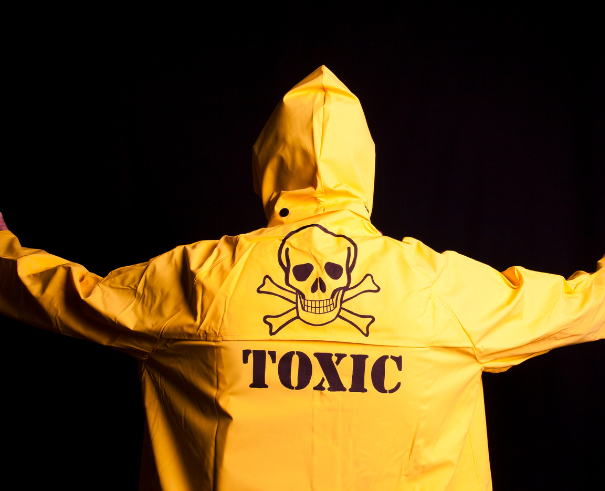September 24, 2023
Do you know the signs you work in a toxic workplace? Is your workplace toxic? Some people enter the workplace with the best intentions, but end up in toxic work cultures that can make them feel very unhappy and unproductive. If you think this might be happening at your job, then it’s worth taking a look at these 20 signs you work in a toxic workplace.
A toxic workplace is characterized not only by poor management and unsupportive colleagues but also by a persistent negative environment that harms employees’ well-being and performance. These unhealthy environments can manifest in various forms, including constant stress, lack of appreciation, discrimination, and an overarching culture of negativity. While any individual can be subjected to a toxic work atmosphere, marginalized groups face added complexities. Particularly for Black women, the challenges extend beyond common workplace issues to include racial and gender-based discrimination, which compounds the toxicity and its effects.

1. Constant Feeling of Dread When You Work in a Toxic Culture
One of the most telltale signs of a toxic workplace is the constant feeling of dread that engulfs an employee at the mere thought of going to work. This isn’t the typical Monday blues but a deeper, more persistent sensation that permeates everyday life. It’s like a weight on one’s shoulders, where weekends or off-days are spent dreading the impending workday rather than rejuvenating. This overwhelming feeling can be an initial warning sign that the environment you’re in is not conducive to your mental well-being.
2. High Turnover Rates Are Signs You Work in a Toxic Workplace
If employees are frequently leaving and new hires become a regular occurrence, it might point towards a larger issue within the company’s fabric. High turnover rates often indicate dissatisfaction, lack of growth opportunities, or persistent workplace problems that aren’t being addressed. While there are industries with naturally high turnover rates, it’s the sudden spikes or consistently high numbers in traditionally stable sectors that should raise eyebrows. Regular resignations, especially from tenured employees, can be a sign that the environment is not worth the paycheck.
3. Excessive Gossip and Backstabbing
Gossip, while prevalent in many social settings, can become toxic when it turns into the main mode of communication within a workplace. A culture dominated by backstabbing, rumors, and office politics undermines trust, team cohesion, and productivity. Instead of fostering collaboration and genuine teamwork, employees find themselves navigating a minefield of hearsay and constantly watching their backs. This culture can lead to decreased morale and increased stress as employees become more concerned about their reputation than their actual tasks.
4. Unsupportive Management
Leadership plays a pivotal role in shaping the workplace environment. When leaders are dismissive, unapproachable, or even the root cause of toxicity, it creates a top-down ripple effect that impacts every employee. Unsupportive management can manifest in various ways in a toxic workplace, from disregarding employee feedback to blatant favoritism. Leaders who don’t listen, who are indifferent to their employees’ well-being, or who perpetuate a toxic culture can swiftly erode the foundations of a positive, productive work environment.

5. Unequal Opportunities and Treatment
The modern workplace is not immune to the pitfalls of systemic inequalities and biases. For Black women, the daily grind can often entail navigating a labyrinth of microaggressions, subtle sidelining, and more overt discriminatory practices. These microaggressions can manifest in seemingly innocuous comments that hint at deeply rooted racial and gender biases or in opportunities consistently given to less qualified counterparts. Blatant discrimination may see Black women passed over for promotions, left out of vital discussions, or treated with suspicion. Such a toxic environment not only stifles their growth and opportunities but also perpetuates harmful stereotypes and inequalities.
6. No Work-Life Balance a Sign You Work in a Toxic Workplace
In an era that praises connectivity and availability, maintaining a work-life balance has become more challenging than ever. While commitment is commendable, consistently long hours and the expectation to be on-call around the clock can erode personal time and well-being. When weekends, vacations, or even the few hours post-work are consumed by job demands, it signifies a toxic tilt in the work-life scale. Such relentless demands not only disrupt personal and family life but also hinder productivity and creativity in the long run.
7. Frequent Burnouts

Burnout is more than mere fatigue; it’s a comprehensive state of physical and emotional exhaustion stemming from prolonged stress or frustration. Regular burnouts suggest that employees are consistently overwhelmed, either due to excessive workloads, unrelenting pressure, or an unsupportive environment. Feeling drained, disengaged, and disenchanted with one’s job day in and day out is a clear sign of a toxic workplace that doesn’t prioritize employee well-being.
8. Lack of Clear Communication
Effective communication is the bedrock of any thriving organization. When job roles remain ambiguous, expectations keep shifting, and feedback is either non-existent or unclear, it creates a fog of uncertainty. Employees constantly second-guessing their duties, or being blindsided by unexpected changes, highlights a significant breakdown in communication. This not only affects job performance but also erodes trust and morale.
9. Fear-Based Leadership
Leadership that leans heavily on intimidation, threats, or inducing fear is a glaring red flag. Instead of inspiring and guiding their team, such managers create an atmosphere of apprehension and mistrust. Employees, instead of taking initiative or being innovative, may become overly cautious, constantly fearing retribution or unexpected reprisals. This suppressive atmosphere stunts growth, curtails creativity, and promotes a culture of mere survival rather than thriving.
10. No Recognition or Appreciation
A simple “thank you” or acknowledgment can go a long way in motivating employees. When hard work goes consistently unnoticed, or worse, is appropriated by others, it’s not only demoralizing but also indicative of a toxic environment. Employees feeling undervalued or invisible may lose the drive to excel, leading to reduced productivity and engagement.
11. Dismissive of Employee Concerns
A listening ear from management is crucial. When grievances are brushed under the rug, trivialized, or met with hostility, it sends a message that employee well-being and concerns aren’t a priority. Over time, this dismissive approach can lead to disillusionment and a feeling of powerlessness among the workforce.
12. Cliques and Favoritism
Every workplace has its dynamics, but when cliques dominate and favoritism is rampant, it becomes toxic. Clear preferential treatment, inner circles, or exclusive groups can ostracize other employees, leading to divisions and resentment. Such environments breed competition of the wrong kind and can significantly impair teamwork and collaboration.


13. Inadequate Training and Resources
Proper training and resources are essential tools for success. When employees are thrown into the deep end without adequate preparation or support, it sets them up for failure. Not providing necessary tools, training, or resources is a hallmark of a toxic workplace that doesn’t invest in its employees’ growth and success.
14. Harassment Goes Unaddressed
A safe workplace is a fundamental right. When any form of harassment—be it racial, sexual, or emotional—is tolerated, ignored, or inadequately addressed, it creates a hostile environment. Especially for Black women, who may face the dual axes of racial and gender discrimination, the effects can be particularly devastating. Any workplace that doesn’t prioritize the safety and dignity of its employees is undeniably toxic.
Related reading: Monsters in the office? How to handle even the worst co-workers
15. Consistently Negative Atmosphere
A workplace dominated by a consistently negative atmosphere is not just draining; it’s toxic. When negativity, pessimism, or cynicism becomes the accepted norm rather than the exception, it can have profound implications. Employees find themselves perpetually bracing for the next problem, gripped by a sense of impending doom. Such an environment stifles creativity, as innovation is overshadowed by constant firefighting. Over time, this continuous cloud of negativity can impact not only job performance but also one’s mental and emotional well-being, as optimism and hope are repeatedly quashed.
16. Retaliation is Common
In a healthy work environment, voicing concerns or providing feedback is not only encouraged but also appreciated. However, in toxic workplaces, speaking up often leads to retaliation. Whether it’s in the form of reduced opportunities, professional sidelining, or even overt hostility, such consequences deter employees from voicing legitimate concerns. This fear of retaliation cultivates an atmosphere of silence and compliance, where problems go unresolved, and employees feel trapped, unable to advocate for positive change without risking their careers.
17. No Room for Growth
Professional stagnation can be incredibly demoralizing. These are key signs you work in a toxic workplace. In workplaces where there’s no room for growth—whether in terms of skill development, upward mobility, or lateral movement—employees often feel stuck. The absence of opportunities for advancement or professional development means talents go unrecognized and potential remains untapped. Over time, this can lead to feelings of resentment and disillusionment as employees grapple with the realization that their aspirations and goals may remain unfulfilled in their current role.
18. Employees Are Discouraged from Taking Time Off
Rest and rejuvenation are essential components of sustained productivity and creativity. When employees are consistently discouraged from taking time off or are made to feel guilty for prioritizing personal time, clear signs you work in a toxic workplace. Whether it’s subtle comments about “dedication” or overt pressure to skip breaks, vacations, or even sick days, such practices not only infringe on employee rights but also jeopardize health and well-being.
19. Unrealistic Expectations
While ambition and striving for excellence are commendable, constantly pushing employees beyond their limits without adequate support is detrimental. Unrealistic expectations can manifest in unattainable deadlines, overwhelming workloads, or demands for perfection. All signs pointing to working in a toxic workplace. Continually operating under such pressure without the necessary resources or support can lead to chronic stress, burnout, and a sense of failure, even when one is giving their all.
20. Personal Values Mismatch
A significant, often overlooked, facet of workplace satisfaction is the alignment of personal values with those of the organization. When there’s a mismatch—whether in terms of ethics, goals, or culture—it can lead to moral distress. Working in an environment that contradicts one’s core beliefs or principles can be mentally taxing. Over time, this discord can result in feelings of compromise, discontent, and a longing for a more congruent professional setting.


Effects of a Toxic Workplace on Confidence and Happiness
A toxic workplace doesn’t just affect professional satisfaction; it permeates every aspect of an individual’s life. The continuous stress, doubt, and negativity can erode one’s self-worth, leading to decreased confidence and happiness. Over time, the signs of a toxic workplace can become internalized, causing workers to question their competence, value, and self-worth. Especially for marginalized groups, like Black women, the compounded effects of workplace toxicity can be especially damaging. These harmful experiences, when repeated, can create a cycle of self-doubt, affecting not just professional aspirations but also overall mental and emotional well-being.
In today’s fast-paced corporate landscape, the detrimental effects of a toxic workplace cannot be overstated. As we’ve delved into, the markers of such an environment range from persistent negativity and unrealistic expectations. As well as more sinister manifestations like retaliation and the suppression of growth.
It’s essential to understand that while recognizing the signs of a toxic environment is crucial. You have to also take proactive steps towards change. If you find yourself nodding in agreement to the symptoms described, feeling trapped in a cycle of stress and self-doubt. Then, it’s time to pause, reflect, and re-evaluate. Your well-being, both mental and emotional, is precious. And no job should consistently rob you of your peace, confidence, or happiness. The journey towards a more fulfilling professional life begins with awareness, followed by informed decisions and actionable steps.
Free Resource
To aid in this transformative journey, we’ve compiled a resource tailored to help you navigate these murky waters.
If you’re feeling overwhelmed and are unsure about where to start, our 📌 FREE PDF – Recognizing Burnout is here to guide you. By asking yourself the crucial 10 questions listed within, you can gauge where you stand and what needs immediate attention.
As you embark on this path of self-awareness and recovery, remember that a happier, freer life awaits on the other side. Don’t let burnout dim your shine. 📌 Sign up today and take the reins of your well-being back into your hands.
Toxic work cultures can have a big impact on your career. I can help you change that.
Toxic work cultures can have a big impact on your physical and mental health. So it’s worth trying to find another job if you can’t change things for the better where you are now. You may be able to find a better job with a more positive work culture. Hiring a career coach is a great investment. As they provide guidance on avoiding toxic work cultures. And we also do confidence coaching and mindset coaching to get you ready for that next level job.
Working with a career coach can be a life-changing experience. They can help you identify your strengths and weaknesses, develop a plan to achieve your goals, and provide support and guidance along the way.
Are you feeling stuck in your career? Lost about your next steps? Or overwhelmed by the job search process? If so, a career coach can help you get back on track. They can provide you with the tools and resources you need to succeed. Like and helping you develop the confidence and mindset to achieve your full potential.
Ready to take the next step in your career?
Schedule a free Career Solution Call today to learn more about how I can help you achieve your goals.
Working with a career coach can also lead to improved mental health, peace of mind. The average salary increase for job switchers? It’s about a 14.8% increase according to US News. When you’re happy and fulfilled in your career, it shows up in all aspects of your life. You’ll be more productive, engaged, and creative at work. And you’ll have more energy and time to enjoy your personal life.

Twanna Carter, PhD, ICF Professional Certified Coach (PCC), is a career coach and relationship coach for Twanna Carter Professional & Personal Coaching, LLC. She is a career coach dedicated to empowering Black women leaders, helping them achieve their career goals. With more than 20+ years of experience, Dr. Twanna is recognized as an expert in leadership, personal development, business strategy, career development, and lifestyle balance. Helping professional women navigate change and uncertainty by providing them with the tools and strategies they need to be successful. Schedule a free 30-Minute Career Solution Call today.
RECOMMENDED FURTHER READING AND RESOURCES**
- “I’m Not Yelling: A Black Woman’s Guide to Navigating the Workplace (Successful Black Business Women)“, Elizabeth Leiba.
- “Crucial Conversations: Tools for Talking When Stakes Are High” by Kerry Patterson, Joseph Grenny, Ron McMillan, and Al Switzler.
- “Influence: The Psychology of Persuasion” by Robert B. Cialdini.
- “How to Win Friends and Influence People” by Dale Carnegie.
- “Lean In: Women, Work, and the Will to Lead” by Sheryl Sandberg.
- “The No Asshole Rule: Building a Civilized Workplace and Surviving One That Isn’t” by Robert I. Sutton.
- “The Memo“, by Minda Harts.
- “Quiet: The Power of Introverts in a World That Can’t Stop Talking” by Susan Cain.
- Unleash your career potential with our free library of resources. Access our free Career Resource Library today and start your journey to a more fulfilling career.
Read my latest blog posts…
- Are You Trapped in Survival Mode? The Real Reason It’s Not Your Fault (and What to Do Next)Are You Trapped in Survival Mode? What “Survival Mode” Really Means For many Black women, survival mode isn’t just a phrase, it’s a… Read more: Are You Trapped in Survival Mode? The Real Reason It’s Not Your Fault (and What to Do Next)
- Why So Many Smart Black Women Experience Fear of Starting a Business, and Feel Completely StuckThe Quiet Struggle Behind Big Dreams Many intelligent, capable Black women dream of owning a business. They envision freedom, flexibility, financial growth, and… Read more: Why So Many Smart Black Women Experience Fear of Starting a Business, and Feel Completely Stuck
- Strategic Career Mapping for Executive Black Women: How to Identify Roles That Reflect Your True StrengthsWhy Strategic Career Mapping Matters More Than Ever In today’s corporate landscape, Strategic Career Mapping has become more than just a buzzword. It’s… Read more: Strategic Career Mapping for Executive Black Women: How to Identify Roles That Reflect Your True Strengths
- The Fear-Based Leadership Cycle Secretly Running Your Life. And How to Break ItFear is a powerful emotion. It can protect you, warn you, and heighten your awareness. But when fear begins to lead you, especially… Read more: The Fear-Based Leadership Cycle Secretly Running Your Life. And How to Break It
- Redefining Success. How Black Women Executives Are Leading a New Era of Authentic LeadershipThe New Leadership Trend. Redefining Success Across boardrooms, Zoom calls, and LinkedIn feeds, a powerful shift is underway. Women of color, especially Black… Read more: Redefining Success. How Black Women Executives Are Leading a New Era of Authentic Leadership
- How to Quiet the Inner Critic and Stop Second-Guessing Yourself in High-Stakes RoomsUnderstanding the Inner Critic Your inner critic is that persistent internal voice that judges, doubts, and second-guesses you. Ooften at the worst possible… Read more: How to Quiet the Inner Critic and Stop Second-Guessing Yourself in High-Stakes Rooms
- The Survival Blueprint. What To Do Immediately When You Realize You’re Being Managed OutUnderstanding What “Being Managed Out” Really Means. And Why Immediate Help Matters The first time I realized I was being managed out, I… Read more: The Survival Blueprint. What To Do Immediately When You Realize You’re Being Managed Out
- 10 Powerful Reasons Why Black Women Entrepreneurs Are Leading the Rise of EntrepreneurshipWhy Black Women Entrepreneurs Are Leading the Rise of Entrepreneurship Entrepreneurship has always symbolized courage, innovation, and self-determination. And no one represents that… Read more: 10 Powerful Reasons Why Black Women Entrepreneurs Are Leading the Rise of Entrepreneurship
- The Leadership Myth That Hurts High-Achieving Black Women. Why Slowing Down Doesn’t Make You Weak.Slowing Down Doesn’t Make You Weak Leadership isn’t just about speed, stamina, or sacrifice. It’s about authenticity, vision, and sustainable strength. Yet, a… Read more: The Leadership Myth That Hurts High-Achieving Black Women. Why Slowing Down Doesn’t Make You Weak.
- Quiet Cracking -7 Signs You’re Not ‘Fine’. You’re Burning Out in SilenceUnderstanding Quiet Cracking Quiet cracking is a modern mental-health phenomenon that describes the slow, invisible unraveling of your emotional resilience. TalentLMS reports that… Read more: Quiet Cracking -7 Signs You’re Not ‘Fine’. You’re Burning Out in Silence
- Top 10 Powerful Reasons for Career Change. Why It’s Never Too Late to Start FreshUnderstanding the Need for a Career Change Changing careers is no longer rare. It’s the new normal. Today, professionals across industries are re-evaluating… Read more: Top 10 Powerful Reasons for Career Change. Why It’s Never Too Late to Start Fresh
- The Hidden Cost of Being the Strong One at WorkThe Unseen Weight of Being the Strong One at Work At every office, there’s usually one person everyone leans on, the dependable one,… Read more: The Hidden Cost of Being the Strong One at Work



















+ show Comments
- Hide Comments
add a comment